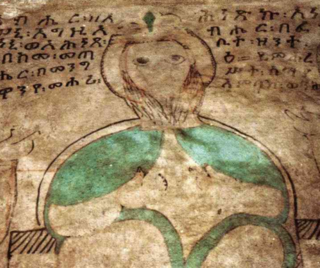Francisco Álvares was a Portuguese missionary and explorer. In 1515 he traveled to Ethiopia as part of the Portuguese embassy to emperor Lebna Dengel accompanied by returning Ethiopian ambassador Matheus. The embassy arrived only in 1520 to Ethiopia where he joined long sought Portuguese envoy Pêro da Covilhã. There he remained six years, returning to Lisbon in 1526-27 having written a report entitled Verdadeira Informação das Terras do Preste João das Índias.

Abune Tekle Haymanot was an Ethiopian saint and monk mostly venerated as a hermit. He was the Abuna of Ethiopia who founded a major monastery in his native province of Shewa. He is significant for being the only Ethiopian saint popular both amongst Ethiopians and outside that country. Tekle Haymanot "is the only Ethiopian saint celebrated officially in foreign churches such as Rome and Egypt." His feast day is 30 August, and the 24th day of every month in the Ethiopian calendar is dedicated to Tekle Haymanot.

Begemder was a province in northwest Ethiopia. The alternative names come from its capital during the 20th century, Gondar.
Na'od was Emperor of Ethiopia from 1494 to 31 July 1507, and a member of the Solomonic dynasty. His regnal name was Anbasa Bazar. His reign was marked by internal tension between territories with the assistance of Queen Eleni. He began construct an extravagant church in Amhara province, called Mekane Selassie. The church was completed by his successor Dawit II in 1530.

Yekuno Amlak ; throne name Tesfa Iyasus was Emperor of Ethiopia, from 1270 to 1285, and the founder of the Solomonic dynasty, which lasted until 1974. He was a ruler from Bete Amhara who became the Emperor of Ethiopia following the defeat of the last Zagwe king.
Takla Maryam, throne name Hezbe Nañ was Emperor of Ethiopia from 1430 to 1433, and a member of the Solomonic dynasty. He was the third son of Dawit I.
This is a list of monarchies of Ethiopia that existed throughout the nation's history. It is divided into kingdoms that were subdivisions of Ethiopia, and kingdoms that were later conquered by Ethiopia. Ancient kingdoms fall into neither category.

Amba Geshen is the name of a mountain in northern Ethiopia. It is in Ambassel, South Wollo Zone of the Amhara Region, northwest of Dessie, at a latitude and a longitude of 11°31′N39°21′E. Part of Ambassel woreda, Amba Geshen is one of the mountains of Ethiopia where most of the male heirs to the Emperor of Ethiopia were interned, usually for life. Also known as Gishen Mariam, it was the second of the three such mountains, or amba, said to have been used for this purpose, the other two being Debre Damo and Wehni.

The Kingdom of Gera was a kingdom in the Gibe region of Ethiopia that emerged in the late 19th century. It shared its northern border with the Kingdom of Gumma, its eastern border with the Kingdom of Gomma, and was separated from the Kingdom of Kaffa to the south by the Gojeb River. With its capital at Chala, the Gera kingdom's territory corresponds approximately with the modern woreda of Gera.

The Gibe region was a historic region in modern southwestern Ethiopia, to the west of the Gibe and Omo Rivers, and north of the Gojeb. It was the location of the former Oromo and Sidama kingdoms of Gera, Gomma, Garo, Gumma, Jimma, and Limmu-Ennarea.

The Kingdom of Gomma was a kingdom in the Gibe region of Ethiopia that emerged in the 18th century. It was based in Agaro.

The Kingdom of Gumma was a kingdom in the Gibe region of Ethiopia that emerged in the 18th century. Its eastern border was formed by the bend of the Didessa River, which separated it from Limmu-Ennarea to the northeast, and the kingdoms of Gomma and Gera to the south. Beyond its northern border were various Macha Oromo groups, and to the west Sidamo groups. Its territory corresponds approximately with the modern woredas of Gechi, Borecha, and Didessa.

The Kingdom of Limmu-Ennarea was one of the kingdoms in the Gibe region of Ethiopia that emerged in the 19th century. It shared its eastern border with the Kingdom of Jimma, its southern border with the Kingdom of Gomma and its western border with the Kingdom of Gumma. Beyond its northern border lay tribes of the Macha Oromo. Jimma was considered the most civilized of the Gibe kingdoms, which had a population in the 1880s between 10,000 and 12,000. It was converted to Islam by missionaries from Emirate of Harar in the first half of the 19th century; C.T. Beke, writing in 1841, reported that its "king and most of his subjects are Mohammedan." Limmu-Ennarea's capital was at Saqqa.
Mara Takla Haymanot was King and the founder of the Zagwe dynasty. Some king lists give his name simply as "Mararah", and other King Lists as "Takla Haymanot".
Yemrehana Krestos was the third king of the Zagwe dynasty, ruling during the second half of the twelfth century. His biography is recorded in the Gädlä Yəmrəḥannä Krəstos. He was first Zagwe king to be recognised as a saint in the Ethiopian Church calendar, and is commemorated on the 19th of Ṭəqəmt(i) (ጥቅምት).
The Battle of Amba Jebelli was fought in Ethiopia in 1854 between the forces of Kassa Hailu, and the forces of Birru Goshu of Gojjam. Kassa was victorious, Birru Goshu was captured and spent the next 14 years in chains.

Bete Amhara was a historical region located in north-central Ethiopia, covering most of the later Wollo Province, along with significant parts of North Shewa. The state had 30 districts, including Ambassel, Lakomelza, Laikueyta, Tatakuyeta, Akamba, Ambassit, Atronsa Mariam, Genete, Feresbahir, Amba Gishen, Gishe Bere, Wasal, Wagada, Mecana-Selasse, Tabor, Tedbaba Mariam, Zoramba, Daje, Demah, Ephrata and Ewarza. The region is the source of much of Ethiopia's clothing, eating culture, language, and education.